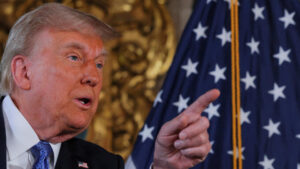The “America suffers loss theory” is untenable and is essentially selfishness

The so-called “America is at a disadvantage” theory is based on the fact that the United States imports more than it exports, resulting in a trade deficit. Some Americans use this absurd logic to stir up social emotions and mislead social cognition, thinking that advocating “Buy American Made” and setting up many barriers for goods exported to the United States can bring back manufacturing and bring jobs. They also use the guise of national security to cover up the trade war by exaggerating “external threats” and fabricating “Mission Impossible” plots. The “textbook-style” performances of politicians and the “Hollywood-style” bitter dramas make people feel as if they are in another world. Economists sneered, “Some Americans should go back to school and make up for their lessons, starting from the ABCs of economics.” The “America is at a disadvantage” theory is subjective, or a priori, but in essence it is egoism, and it exudes the stench of selfishness – it only makes a fuss about the trade deficit data it has compiled, and fails to recognize the supply and demand relationship with a rational, fair and scientific attitude. They do not reflect on the shortcomings of their own economic structure, the harm of fiscal policy of living beyond their means, or the consequences of low savings rate of the whole people. Instead, they turn the tables, shift contradictions, and put the blame on others. In their eyes, normal international trade has become plunder. They neither see equivalent exchange nor are they deaf to cheap goods. They also ignore the reality of voluntary signing of contracts and mutual benefit and win-win between the two parties in trade. It seems that trade deficit has become a one-way payment, a free lunch, and charity. Economic common sense tells us that the current account deficit does have both advantages and disadvantages. Which side of the effect is dominant depends on specific issues. American scholar Adam Haye found that although economic theory generally believes that long-term trade deficits have a negative impact on the national economy, the fact that the United States is the world’s largest trade deficit country proves an exception. Because the United States is the largest economy and the US dollar is the world’s reserve currency, although the trade deficit leads to the “outflow” of the US dollar, the United States has largely attracted foreign direct investment and issued foreign debts to allow large amounts of US dollars to flow back. In this “dollar dividend” effect, how can there be any shadow of suffering losses due to the deficit?





